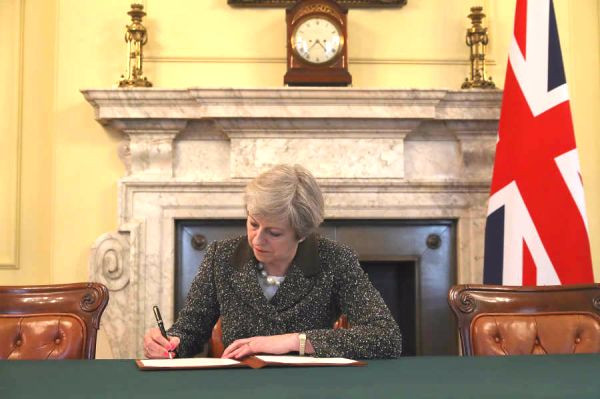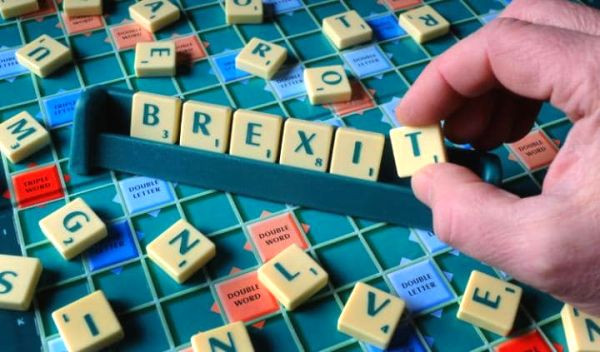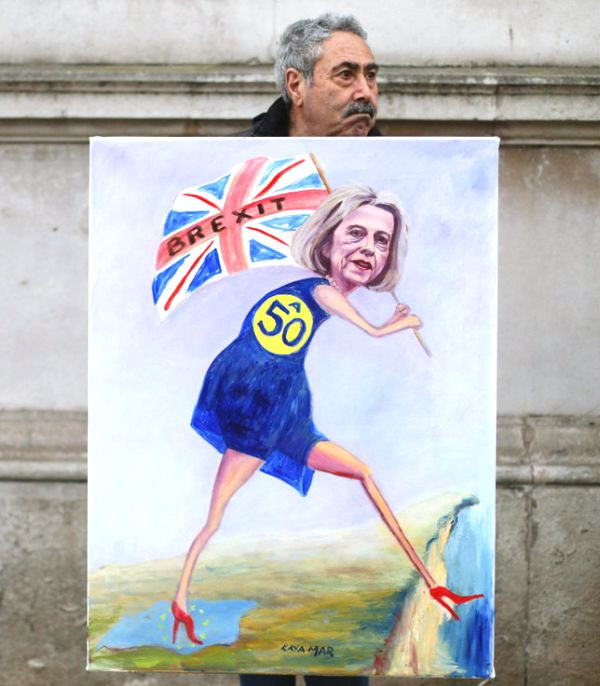UK - EU: When both no longer want to live together
(Baonghean) - The "divorce" story between the UK and the European Union has reached a decisive moment. British Prime Minister Theresa May's signing of a letter to the EU officially activating Article 50 of the Lisbon Treaty on March 28 has turned a new page for this relationship.
Between two streams
After more than four decades of “being together”, the relationship between the UK and the European Union has reached a decisive moment. Whether we like it or not, despite many “fateful ties” holding us back, everyone must accept the fact that both sides must abide by the results of the referendum last June: the majority of the British people supported leaving the EU.
And the fact that Prime Minister Theresa May represented the UK in signing a letter to European Council President Donald Tusk about leaving the Union was just a historic ritual for this farewell.
Britain will now have to chart a new course for its relationship with Europe. It could be a friendly and fair relationship for both sides. Or it could be a stormy transition with a very high price to pay. That depends on the next two years of negotiations.
 |
| British Prime Minister Theresa May signed the official document activating Article 50 of the Lisbon Treaty on March 28. Photo: Independent. |
In fact, on the historic evening of signing the letter to European leaders, the British Prime Minister had separate phone calls with EU President Donald Tusk, European Commission President Jean-Claude Juncker, and German Chancellor Angela Merkel, individuals who will have decisive roles on the EU side.
The British Prime Minister's Office said that in the phone calls, the leaders agreed that "a strong Europe is in the interests of all parties and the UK will remain a trusted and close ally".
The leaders also agreed on the importance of entering negotiations in a constructive and positive spirit, as well as ensuring a smooth and orderly withdrawal process.
On March 29, Prime Minister May also gave a speech to the British Parliament and pledged to represent the interests of all those living in the UK, including EU citizens, during negotiations with Brussels.
Stormy wait
The UK and EU ending their “one family” relationship will be complicated and time-consuming. Simply because there are too many ties between the two sides and ending this relationship will affect many interests. Despite British Prime Minister Theresa May’s commitment to a more flexible stance in Brexit negotiations, not many people believe in such a prospect.
Firstly, there is little sign that the UK and EU will compromise in the negotiations. The EU has made it clear that the UK must agree to “the principles of an orderly withdrawal from the EU” before talking about trade negotiations.
Specifically, the UK needs to agree on its financial obligations as well as clarify the rights of 4 million immigrants, including EU citizens in the UK and British citizens in the EU. The head of the EU's negotiating delegation, Michel Barnier, said that a new UK-EU partnership would take time and that agreements on the transition period were necessary.
The measures taken will remain within the framework of EU law and the European Court of Justice (ECJ). This means that the UK will remain subject to EU law and subject to the jurisdiction of the ECJ.
On the contrary, the British government wants to resolve the “divorce” as quickly as possible, which means defining the bilateral relationship along with a free trade agreement. The British government even reserves the view that it will firmly get a good deal or nothing at all.
The UK wants to scrap some of the EU's current regulations, which London says are hampering the UK economy, as soon as the negotiations end in March 2019, rather than waiting until the end of the transition period. It is currently unclear how long this transition period will last.
Brexit shock
While the public awaits the negotiations over the next 24 months, the market is thinking differently about the “breakup”. It is the internal economic shifts between the UK and the EU that will be most interesting at the moment.
 |
| The negotiations between the UK and the EU raise many questions. Photo: Telegraph |
There are some positive signs on the threshold of triggering negotiations. The UK economy grew by a respectable 1.8% of GDP last year and is forecast to grow by 2% in 2017. But this is seen as the calm before the storm following the EU talks.
This achievement is due to the wise management of the British government, thanks to the liquidity support measures from the Bank of England for the banking system and thanks to the unwavering confidence of consumers.
However, there are still some fundamental consequences that have been warned after the UK officially sat down at the negotiating table. S&P's top economist Boris Glass said that in early 2017, the capital needs of businesses and households had somewhat decreased, these were the first signs that the economy would gradually slow down.
Consumers are also starting to see prices rise rapidly as the falling pound makes imports more expensive.
 |
| Cartoon outside 10 Downing Street on the day Article 50 of the Lisbon Treaty was triggered. Photo: Daily Star |
Invoking Article 50 of the Lisbon Treaty is like officially “riding the tiger’s back” as the UK will have to prepare for a “blank” scenario after the negotiations. If that happens, London and Brussels will have no trade agreement to define the relationship. A series of breakdowns is inevitable.
Phan Tung
| RELATED NEWS |
|---|

